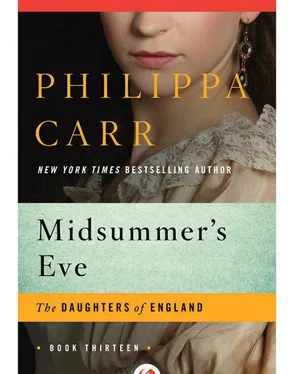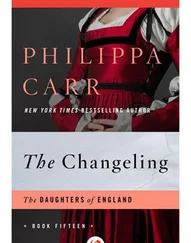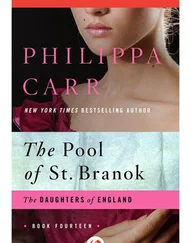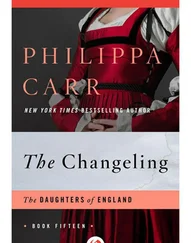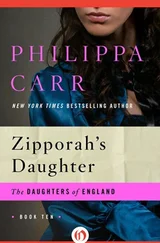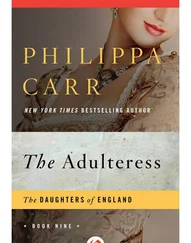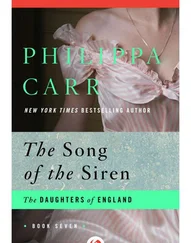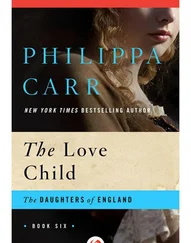Philippa Carr
Midsummer’s Eve
I WAS NOT QUITE nine years old on that Midsummer’s Eve, but I shall never forget it because, after what happened on that memorable night, I ceased to be the innocent girl I had been up to that time.
My comfortable home, my easy life and my adored parents had given me no indication that such things could be. We lived amicably in what was more like a castle than a house. It had been the family home of the Cadorsons for generations. Cador meant “warrior” in the Cornish language, so our earliest ancestor must have been a great fighter. I could well believe that. The house stood on a cliff, so that from the windows we could look out on the sea. Built of grey stone, it looked forbidding. It was like a fortress. It probably had been at one time. There were two turrets and a path along the battlements from one to the other. It was known simply as Cador. My father was proud of it—my mother, too, although I sometimes thought she was a little nostalgic for her home on the other side of England—the south east corner. We were in the south west so when we visited my grandparents, or they came to us, it meant travelling the breadth of England.
When I was younger the grandparents used to come to us fairly often. Now we had to go to them for they were getting old, particularly Grandpapa Dickon.
Cador was situated about a quarter of a mile from the little town of West Poldorey, which was divided from East Poldorey by the river which cut through the wooded hills to flow into the sea. The two towns were connected by a bridge which had stood up to the weather for five hundred years and looked as if it would last as many more. Old men liked to congregate there and lean over the stone parapets contemplating life and the river. A great number of those men were fishermen and there were always boats lying in the little harbour.
I loved to be there when the fishing boats came in and to watch all the activity on the quay, which was always accompanied by the cry of the seagulls as they flew low watching for any of the fish which would be thrown back into the river.
The Cadors had for generations been lords of the manor whose unspoken duty it was to make sure of the prosperity of the two towns and the outlying neighbourhood. Consequently my brother and I were always treated with respect by the townsfolk. It was a very happy, cosy existence until I was brought face to face with another aspect of life on that Midsummer’s Eve.
There was a family house in London, too. We used to meet there for it was not so very far for the grandparents to come—though it was a long journey for us. I loved travelling. As we went along through the narrow winding lanes my father often told us stories about highwaymen who held up coaches and demanded money. My mother would cry: “Stop it, Jake. You’re frightening the children.” That was true; but like most children we enjoyed being frightened while we felt perfectly safe in the company of our parents.
I loved them both dearly. I was sure they were the best parents in the world; but I did have a special feeling for my father and I think he had for me. Jacco was my mother’s favourite—not so much because he was a boy but because she knew I was my father’s, and she felt it necessary to adjust the balance.
My father was one of the two most exciting men I knew. The other was Rolf Hanson. My father was very tall and dark; he had very bright sparkling eyes which gave the impression that he was amused by life, although he could be serious sometimes. He had had an adventurous life and often talked about it. He had lived with the gypsies at one time; he had killed a man and been sent to Australia as a punishment and stayed there for nine years. My mother was beautiful with dark eyes and hair. It was small wonder that I was dark-haired; but I had inherited Grandmother Lottie’s blue eyes which, as my mother said, turned up now and then in her family. I was on good terms with my brother Jacco though we had our differences now and then. Jacco was named after our father so he was Jake really. When he had been a baby he was known as Little Jake but it became confusing to have two Jakes in the family so he was called Jacco and that name stayed with him.
It was wonderful to live near the sea. On hot days Jacco and I would take off our shoes and stockings and paddle in the cove just below Cador. Sometimes we would get one of the fishermen to take us out and we went sailing out of the harbour and along the coast towards Plymouth Sound. Sometimes we caught shrimps and baby crabs and we hunted for semi-precious stones like topaz and amethyst along the shore. We often saw the poor people down on the beach collecting limpets which they used for some sort of dish, and perhaps buying the last of the fish which the fishermen had brought in and which had failed to find buyers among the more monied folk. I liked to go down with Isaacs our butler and listen to him bargaining for fish. He was a very stately gentleman and even Jacco was a little in awe of him. When Isaacs took the fish back to the house Mrs. Penlock, the cook, would examine it carefully and if it were not to her liking she would show her disapproval in her usual forceful manner. She was a very garrulous woman. Many times I heard her complain: “Is this the best you could do, Mr. Isaacs? My patience me, what am I expected to do with this? Couldn’t you find me some nice plaice or some sizable John Dorys?” Mr. Isaacs always had the power to subdue any of his staff. He would sternly retort, “It is God who decides what goes into the sea and what comes out of it, Mrs. Penlock.” That would silence her. She was very superstitious and afraid to question the matter when put like that.
It was at the quayside that I first noticed Digory. Lean, lively, his skin tanned to a deep brown by the weather, his black hair a mass of curls, his small dark eyes alert and cunning, his trousers ragged and his feet bare, he darted among the tubs and creels with the slippery ease of an eel and the cunning of a monkey.
He had sidled up to a tub of pilchards while fisherman Jack Gort was arguing with Isaacs about the price of hake and had his back to us. I gasped, for Digory had thrust his hand into the tub and picked up a handful of fish which, with a skill which must have come from long training, he slipped into a bag.
I opened my mouth to call Jack Gort’s attention to the theft but Digory was looking straight at me. He put his finger to his mouth as though commanding silence; and oddly enough I was silent. Then, almost mockingly, he took another handful of fish which went into the bag, conveniently there for this purpose. He grinned at me before he darted away from the quayside.
I was too astounded to speak, and when Jack Gort had finished his conference with Isaacs, I said nothing. I watched anxiously while Jack surveyed the tub but apparently he did not notice that some of his stock had vanished, for he said nothing.
I believe Digory thought that because I had witnessed his villainy and not reported it, I had more or less connived at it; and that gave us a special understanding.
Shortly afterwards when I was walking in the woods, I saw him again. He was lying on the bank throwing stones into the river.
“Hi there,” he said as I drew level with him.
I was about to walk haughtily past. That was not the way in which humble people spoke to our family and I thought he could not know who I was.
He seemed to read my thoughts for he said again: “Hi there, Cadorson girl.”
“So … you know me?”
“’Course I know ’ee. Everyone knows Cadorsons. Didn’t I see ’ee down at the fish market?”
“I saw you steal fish,” I said.
“Did ’ee and all.”
Читать дальше
